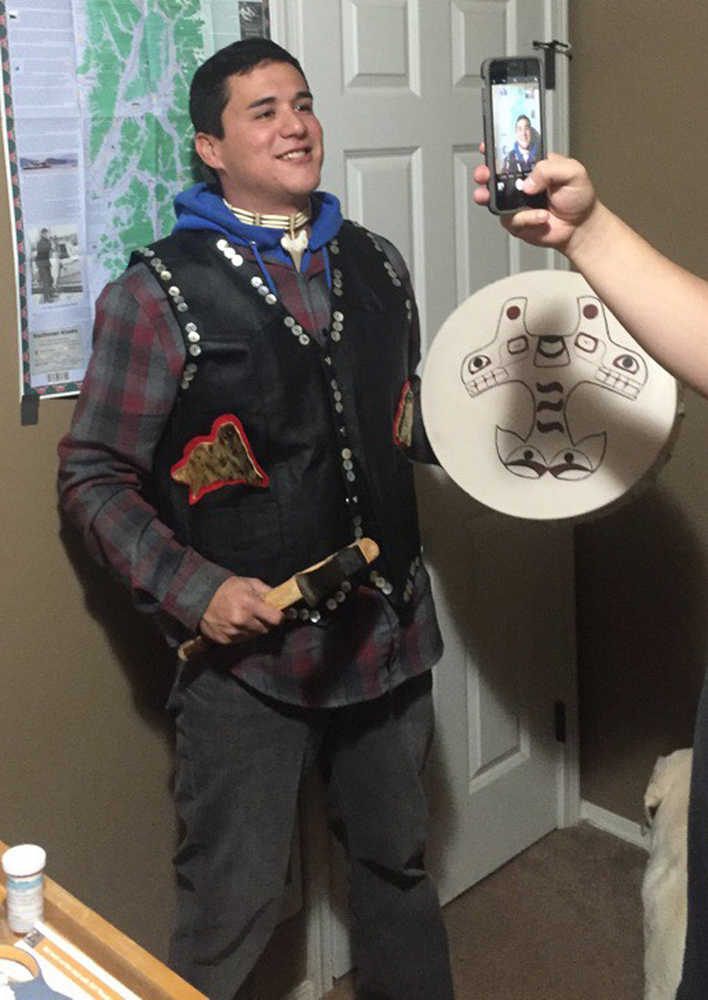Growing up half white, half Tlingit, Juneau local Angelo Katasse has always had a foot in two worlds.
“Something that I grew up hearing a lot was: “You’re not like the rest of them” — not knowing what that even meant,” Katasse said over coffee Friday afternoon. “Right now I am kind of at this crossroads, like, what is my identity?”
He always ran from this question, but a recent trip to Cannon Ball, ND to join demonstrations against the controversial Dakota Access Pipeline, has the 29-year-old reevaluating his roots and embracing his heritage.
Thousands have made the trip to Cannon Ball in the past few months in an effort to halt the completion of a 1,200-mile crude oil pipeline opponents say was illegally conceived. The push to stop the pipeline has gained national traction, with dozens of Native American tribes making the trip to Cannon Ball.
In July, the Standing Rock Sioux, of North and South Dakota, sued the Army Corps of Engineers, which approved the project, saying the pipeline “threatens the Tribe’s environmental and economic well-being, and would damage and destroy sites of great historic, religious, and cultural significance.” The suit is still in litigation.
Katasse had been keeping track of the issue since August, but hadn’t given it much thought until meeting with his kindergarten-age niece. She studies in a Tlingit language immersion program at Harborview; her pride spurred Katasse to make the trip.
“I was blown off my feet that this little kindergartner could talk to me in Tlingit and was so proud and not thinking twice, and here I am, a grown man, and what have I done for my people?” Katasse said. “That was the driving force. I went down there with the mindset that, even if I don’t change what’s going to happen in 40, 50 years, at least I can say I was a part of it.”
Over Veterans’ Day weekend, he flew to North Dakota to help “water keepers” — the thousands at Cannon Ball prefer that term over protesters — keep opposition to the controversial project going.
“What I expected was the opening scene in Terminator 2: just man vs. machine, and it wasn’t like that at all,” Katasse said.
There were snipers, turrets, scores of riot police — an undoubtedly outsized military presence, he noted, but despite the ever present spectre of violence, the singularity of the cause enveloped the Eagle Clan member, fulfilling a previously-empty sense of belonging.
“Eventually, I forgot that we are constantly being watched, that there are snipers, there are turrets, because everyone has the same goal there. Everybody’s idea is to survive the winter and stop the drilling. Since everyone has that collective goal, everybody is there to embrace each other,” Katasse said. “I went down there expecting a fight and I came back more spiritually in-tune than I ever have in my life.”
Katasse never found it easy to take pride in his identity. At best, he felt torn and uneasy.
On one hand, he says he wakes up everyday proud to live in America and doesn’t feel like he has any less opportunity than anyone else. He has a great respect for the military and law enforcement: If World War III was imminent, he mused, he’d wouldn’t wait to be drafted, he would proudly enlist.
But by the same token, Standing Rock represented just one more instance of the federal government yanking first nations people around. For Katasse and many others, it was the straw that broke the camel’s back: this was where he would “metaphorically enlist,” he said.
“For the first time in my life I felt alienated from the country that I thought was supposed to save us,” he said. “What was and is taking place in North Dakota is exactly what I’ve always read about: They promise one thing and something else happens.”
Katasse spent the first day finding out where he could help. After he made a trip into town to purchase clothes and food with his fundraising money, he went to work building concrete huts designated for additional housing, food-prep, dumpsters or even sweat houses — whatever the water keepers needed in the area.
An amateur standup comic, he developed a reputation as a raconteur at camp gatherings. In a central part of camp, an emcee would be on the mic everyday from 5 a.m. until dark, reminding water keepers what they were there for and keeping morale high.
Katasse found himself on the mic the first night. He won’t soon forget the moment.
“I just kind of belted everything from my heart,” Katasse said. “I talked about how the most valuable lesson I’ve learned in the past couple of years was to shut up and let the elders speak, listen when they talk. As soon as I said that, all the people in the audience started drumming, and screaming like “Ye, ye, ye,” and it just sent chills down my back.”
For now, Katasse will content himself with helping the effort from a distance: he plans on doing a silverware drive to help eliminate the camp’s need to import plastic cutlery.
• Contact Sports and Outdoors reporter Kevin Gullufsen at 523-2228 or kevin.gullufsen@juneauempire.com.

